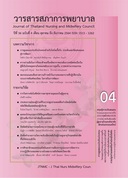Chronotypes and Scheduling Needs of Nurses Operating in University-Affliated Hospitals
Keywords:
chronotypes, shift-scheduling needs, nurses; university-affliated hospitalsAbstract
Objective: To examine university-affliated hospital nurses’ chronotypes and corresponding shift-scheduling needs
Design: Descriptive study
Methodology: The sample consisted of 831 nurses having served in the nursing divisions of university-affliated hospitals for a minimum of one year and assigned to at least one afternoon or night shift per month. Data were collected using a questionnaire distributed and retrieved via Google Form. The questionnaire consisted of three parts: 1) the demographic data form; 2) the scheduling needs survey; and 3) the Thai version of the Morningness-Eveningness Questionnaire (T-MEQ). The data was analysed using descriptive statistics and a chi-square test.
Results: The majority of the nurses (64.7%) exhibited the intermediate chronotype, which correlated significantly to the need to be assigned to work sessions that overlapped night shifts, 10-hour-per-day work, assignment to one shift type, work experience, types of patients under care, marital status, and personal responsibilities (p < 0.05). Concerning scheduling needs, slightly over half of the nurses (51.4%) preferred the morning shift, about three-fourths (73.9%) preferred sessions overlapping the morning shift, and nearly all (93.5%) wished they could choose when to have holidays. Also, a huge majority of the nurses (90.5%) wanted to avoid being rotated or seconded to a different division, whilst nearly two-thirds (65.8%) wanted to avoid being assigned to only one shift type. Work experience, types of patients under care, marital status, and personal responsibilities correlated significantly to shift-scheduling needs and assignment to one shift type (p < 0.05).
Recommendations: It is recommended that hospital administrators and ward managers survey the nurses’ chronotypes and scheduling needs, offer them opportunities to choose the shift types, and make shift scheduling more flexible.
Downloads
References
Muecke S. Effects of rotating night shifts: literature review. J Adv Nurs. 2005 May;50(4):433-9. doi: 10.1111/j.1365-2648.2005.03409.x. PMID: 15842451.
Ruangtrakul S. Sleep disorders assessment and treatment. Bangkok: Ruen Kaew Printing; 2007. (in Thai)
Cappadona R, Di Simone E, De Giorgi A, Boari B, Di Muzio M, Greco P, et al. Individual circadian preference,
shift work, and risk of medication errors: a cross-sectional web survey among Italian midwives. Int J Environ Res
Public Health. 2020 Aug 11;17(16):5810. doi: 10.3390/ijerph17165810. PMID: 32796648; PMCID: PMC7460124.
Hongwaranon Kanjana. A study of the circadian type and shift work to fatigue among shift-working nurses
at Phatthalung Hospital. Phatthalung Hospital [Master of Science thesis]. Songkhla: Prince of Songkla University; 2559. (in Thai)
Khunthar A, Thongchareon V, Namthep J, Klayklongjit S. Predicting factors of intent to stay among professional
nurses in a university hospital. Journal of Nursing Science. 2012;30(4):7-17. (in Thai)
International Workplace Group. The annual IWG global workspace survey welcome to generation flex – the employee power shift. International Workplace Group .March 2019.
Horne JA, Ostberg O. A self-assessment questionnaire to determine Morningness - Eveningness uestionnaires,
in human circadian rhythms. Int J Chronobiol. 1976; 4(2): 97-110.
Ngamjarus C, Chongsuvivatwong V, McNeil E, Holling H. Enhancement of learning on sample size calculation
with a smartphone application: A cluster-randomized controlled trial. Southeast Asian J Trop Med Public Health. 2017.
Udomrat P, Yodprom P, Chusong T. Sensitivity and specifcity of the Thai - Morningness Eveningness Questionnaire (T-MEQ) in relation to the daily body temperature. Journal of Psychiatric Association of
Thailand. 2007; 52 (4): 352-67. (in Thai)
Tankova I, Adan A, Buela CG. Circadian typology and individual differences. A review. Personality and individual differences. 1994 May 16(5): 671-684. doi.org/10.1016/0191-8869(94)90209-7.
Rodwell J, Fernando J. Managing work across shifts: not all shifts are equal. J Nurs Scholarsh. 2016 Jul;
(4):397-405. doi: 10.1111/jnu.12220. Epub 2016 May 26. PMID: 27228576.
Silva RMD, Zeitoune RCG, Beck CLC, Martino MMF, Prestes FC, Loro MM. Chronotype and work shift in nursing workers of university hospitals. Rev Bras Enferm. 2017 Sep-Oct;70(5):958-964. doi: 10.1590/ 0034-7167-2016-0542. PMID: 28977221.
Reinke L, Özbay Y, Dieperink W, Tulleken JE. The effect of chronotype on sleepiness, fatigue, and psychomotor
vigilance of ICU nurses during the night shift. Intensive Care Med. 2015 Apr;41(4):657-66. doi: 10.1007/ s00134-015-3667-7. Epub 2015 Feb 12. PMID: 25672276; PMCID: PMC4392115.
Rerkluenrit J, Kodchakri R. A Study of the Relationship between selected personal factors, professional practice environment and job satisfaction of registered nurses in Thailand. Srinagarind medical Journal. 2019;34(3):287-92. (in Thai)
Stimpfel AW, Sloane DM, Aiken LH. The longer the shifts for hospital nurses, the higher the levels of burnout
and patient dissatisfaction. Health Aff (Millwood). 2012 Nov;31(11):2501-9. doi: 10.1377/hlthaff. 2011.1377. PMID: 23129681; PMCID: PMC 3608421.
Sombatboon Marisa. Concepts and management of manpower in nursing service units. Bangkok: P.A.
Living industry; 2003. (in Thai)
Ball J, Day T, Murrells T, Dall’Ora C, Rafferty AM, Griffths P, Maben J. Cross-sectional examination of the association between shift length and hospital nurses job satisfaction and nurse reported quality measures. BMC Nurs. 2017 May 25;16:26. doi: 10.1186/s12912-017-0221-7. PMID: 28559745; PMCID: PMC5445490.








